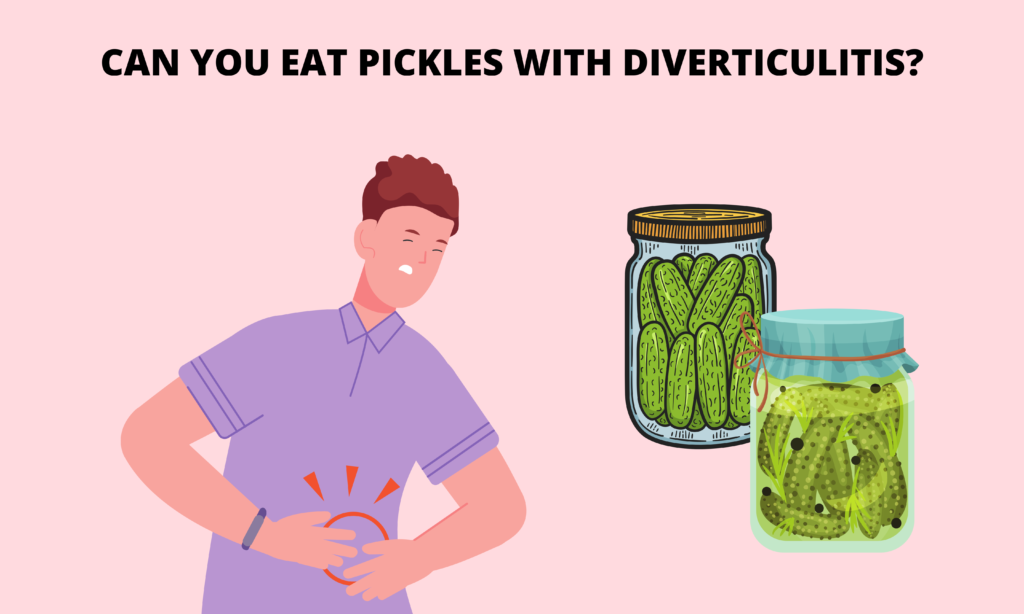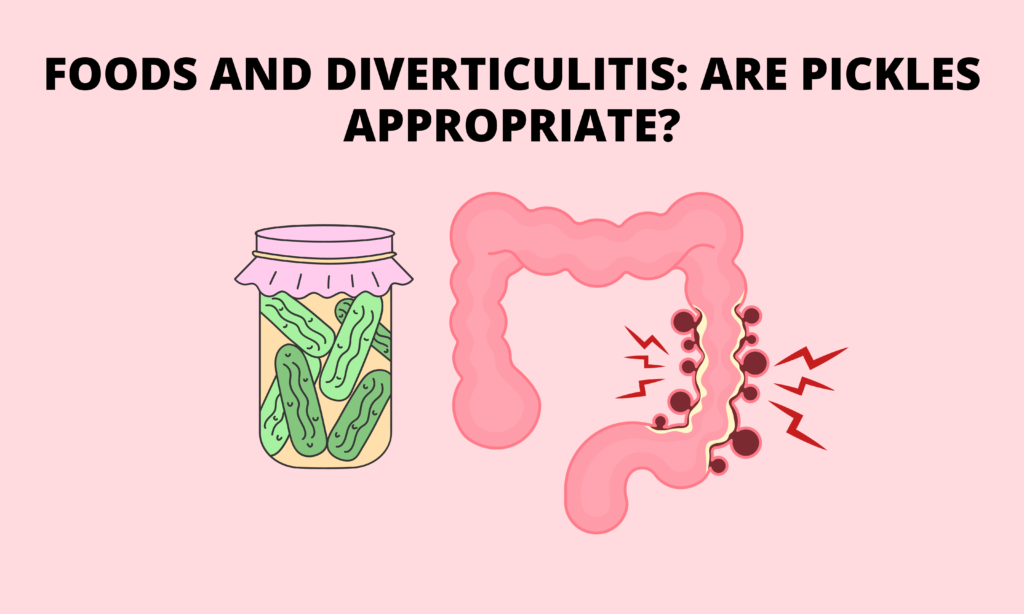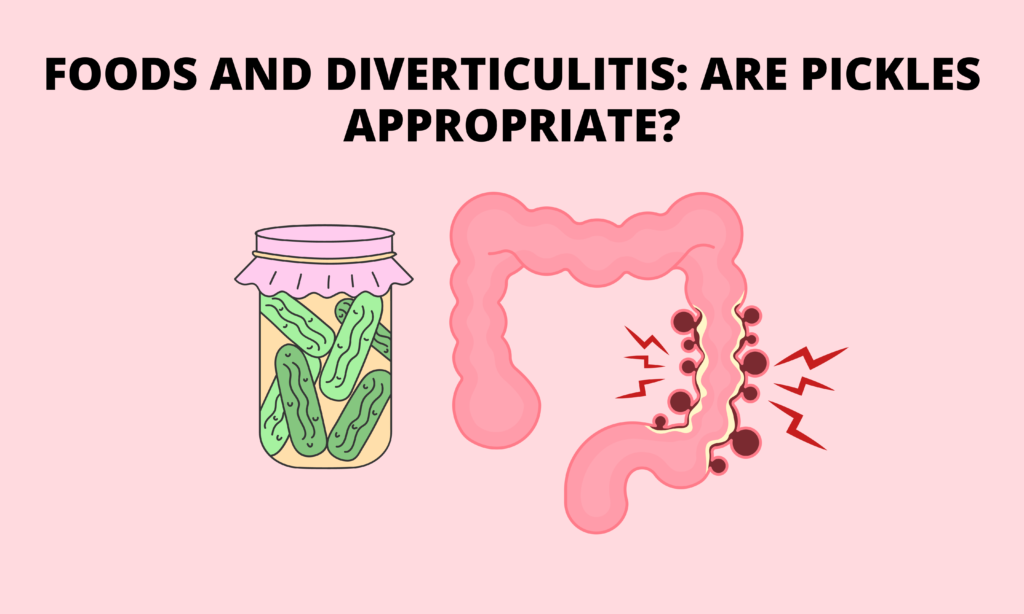
Diverticulitis is a condition that occurs when small pouches or sacs, called diverticula, form in the lining of the digestive system, usually in the colon. These sacs can become inflamed or infected, leading to symptoms such as abdominal pain, fever, and changes in bowel habits. If you’re suffering from diverticulitis, you may be wondering, “Can you eat pickles with diverticulitis?” The answer is not straightforward, and it depends on a few factors.
- Firstly, it’s important to understand what pickles are and how they’re made. Pickles are typically made from cucumbers that are soaked in a solution of vinegar, water, and salt. The vinegar acts as a natural preservative and gives pickles their distinct sour taste. While pickles can be a healthy snack for some people, they may not be suitable for everyone, especially those with diverticulitis.
- Secondly, it’s essential to consider the stage and severity of your diverticulitis. If you’re in the midst of a diverticulitis flare-up, it’s best to avoid pickles altogether. The high vinegar content in pickles can irritate your digestive system, leading to more inflammation and discomfort. However, if your diverticulitis is under control and you’re not experiencing any symptoms, you may be able to eat pickles in moderation.
Lastly, you should also consider your individual tolerance for pickles. While some people with diverticulitis may be able to eat pickles without any issues, others may find that pickles worsen their symptoms. It’s always best to start with small amounts of pickles and see how your body responds. If you experience any abdominal pain, bloating, or changes in bowel habits after eating pickles, you should avoid them in the future.
In conclusion, can you eat pickles with diverticulitis? The answer is that it depends on a few factors, including the severity of your diverticulitis, your individual tolerance for pickles, and how they’re prepared. If you’re unsure about whether pickles are suitable for your condition, it’s always best to consult with your healthcare provider or a registered dietitian who can provide personalized recommendations based on your needs and medical history.
What is Diverticulitis?
Diverticulitis is a common condition that affects the digestive system, specifically the colon or large intestine. It is characterized by the inflammation or infection of small pouches or sacs in the lining of the colon, called diverticula. This condition can cause various symptoms such as abdominal pain, fever, nausea, vomiting, and changes in bowel habits. While there are many ways to manage diverticulitis, one question that often arises is, “can you eat pickles with diverticulitis?”
To answer this question, it’s important to understand what pickles are and how they’re made. Pickles are cucumbers that have been preserved in a solution of vinegar, water, and salt. The vinegar acts as a natural preservative and gives pickles their distinct sour taste. While pickles can be a healthy snack for some people, they may not be suitable for everyone, especially those with diverticulitis.
During a diverticulitis flare-up, it’s best to avoid foods that can irritate the digestive system, such as pickles. The high vinegar content in pickles can be particularly irritating and cause more inflammation and discomfort in the colon. It’s best to stick to a diet that is low in fiber and easy to digest during a flare-up, such as clear broths, low-fiber fruits, and vegetables, and lean protein sources.
However, once your diverticulitis is under control and you’re not experiencing any symptoms, you may be able to eat pickles in moderation. It’s important to start with small amounts and see how your body responds. If you experience any abdominal pain, bloating, or changes in bowel habits after eating pickles, you should avoid them in the future.
In addition to avoiding pickles during a flare-up, it’s also essential to maintain a healthy and balanced diet to prevent future flare-ups. This can include foods that are high in fiber, such as whole grains, fruits, and vegetables. A diet that is high in fiber can help prevent constipation, which can contribute to the development of diverticula.
In conclusion, while pickles can be a healthy snack for some people, those with diverticulitis should avoid them during a flare-up. Once the condition is under control, pickles can be consumed in moderation, but it’s important to monitor how your body responds. Maintaining a healthy and balanced diet is essential for managing diverticulitis and preventing future flare-ups.
Foods and diverticulitis: Are pickles appropriate?

Diverticulitis is a common digestive condition that affects the colon or large intestine. It is characterized by the inflammation or infection of small pouches or sacs in the lining of the colon, called diverticula. While there is no specific diet that can cure or prevent diverticulitis, eating a balanced diet that includes a variety of foods can help manage symptoms and prevent future flare-ups. One question that often arises is, “can you eat pickles with diverticulitis?”
Pickles are cucumbers that have been preserved in a solution of vinegar, water, and salt. While pickles can be a healthy snack for some people, they may not be suitable for everyone, especially those with diverticulitis. During a diverticulitis flare-up, it's best to avoid foods that can irritate the digestive system, such as pickles. The high vinegar content in pickles can be particularly irritating and cause more inflammation and discomfort in the colon.
However, once your diverticulitis is under control, you may be able to eat pickles in moderation. It’s important to start with small amounts and see how your body responds. If you experience any abdominal pain, bloating, or changes in bowel habits after eating pickles, you should avoid them in the future. It’s important to remember that everyone’s digestive system is different, and what works for one person may not work for another.
When it comes to managing diverticulitis, it’s important to focus on a diet that is rich in fiber. A high-fiber diet can help prevent constipation, which can contribute to the development of diverticula. Foods that are high in fiber include whole grains, fruits, vegetables, and legumes. It’s important to increase your fiber intake gradually and drink plenty of water to prevent bloating and discomfort.
In addition to fiber, it’s important to include lean protein sources, such as fish, poultry, and beans, and healthy fats, such as olive oil and nuts, in your diet. Avoiding processed foods and limiting your intake of red meat and saturated fats can also help manage symptoms of diverticulitis.
In conclusion, while pickles may not be appropriate during a diverticulitis flare-up, they can be consumed in moderation once the condition is under control. A balanced diet that includes a variety of foods, particularly those that are high in fiber, lean protein, and healthy fats, can help manage symptoms of diverticulitis and prevent future flare-ups. As always, it’s important to listen to your body and consult with your healthcare provider or a registered dietitian for personalized recommendations based on your needs and medical history.
How to get rid of Diverticulitis

Diverticulitis is a common condition that affects the digestive system, specifically the colon or large intestine. It is characterized by the inflammation or infection of small pouches or sacs in the lining of the colon, called diverticula. While there is no cure for diverticulitis, there are several ways to manage the condition and prevent future flare-ups. One question that often arises is, “can you eat pickles with diverticulitis?”
To manage diverticulitis, it’s important to focus on a healthy and balanced diet that includes a variety of foods. During a diverticulitis flare-up, it’s best to avoid foods that can irritate the digestive system, such as pickles. The high vinegar content in pickles can be particularly irritating and cause more inflammation and discomfort in the colon. It’s best to stick to a low-fiber diet that is easy to digest during a flare-up, such as clear broths, low-fiber fruits, and vegetables, and lean protein sources.
Once the diverticulitis is under control, it’s important to gradually increase your fiber intake to prevent future flare-ups. Foods that are high in fiber include whole grains, fruits, vegetables, and legumes. It’s important to increase your fiber intake gradually and drink plenty of water to prevent bloating and discomfort. While some people may be able to tolerate pickles in moderation, it’s important to monitor how your body responds and avoid them if they cause discomfort.
In addition to diet, regular exercise can also help manage diverticulitis. Exercise can help improve bowel function and reduce the risk of constipation, which can contribute to the development of diverticula. It’s important to talk to your healthcare provider before starting any exercise program, especially if you have other health conditions.
In some cases, medication may be necessary to manage diverticulitis. Antibiotics may be prescribed to treat an infection, and pain relievers may be recommended to manage symptoms. In severe cases, surgery may be necessary to remove the affected part of the colon.
In conclusion, while there is no cure for diverticulitis, it can be managed through a healthy and balanced diet, regular exercise, and medication if necessary. During a flare-up, it’s best to avoid foods that can irritate the digestive system, such as pickles. Once the condition is under control, it’s important to gradually increase your fiber intake and monitor how your body responds to different foods. It’s also important to talk to your healthcare provider about any concerns or questions you may have about managing diverticulitis.
FAQs
Diverticulitis is a common digestive condition that affects many people. As a result, there are often many questions and concerns regarding the best ways to manage the condition. One common question that arises is, “can you eat pickles with diverticulitis?” Here are some frequently asked questions about diverticulitis.
- Q: Can you eat pickles with diverticulitis?
A: During a diverticulitis flare-up, it’s best to avoid foods that can irritate the digestive system, such as pickles. The high vinegar content in pickles can be particularly irritating and cause more inflammation and discomfort in the colon. It’s best to stick to a low-fiber diet that is easy to digest during a flare-up, such as clear broths, low-fiber fruits, and vegetables, and lean protein sources.
- Q: What foods should I avoid with diverticulitis?
A: During a diverticulitis flare-up, it’s best to avoid foods that are high in fiber and can be difficult to digest, such as whole grains, nuts, seeds, and raw fruits and vegetables. Additionally, it’s best to avoid foods that can irritate the digestive system, such as spicy or fried foods, and to limit dairy products and caffeine.
- Q: How can I prevent diverticulitis?
A: While there is no guaranteed way to prevent diverticulitis, there are several lifestyle changes that can help reduce the risk of developing the condition. Maintaining a healthy and balanced diet that is high in fiber and low in fat and processed foods can help promote digestive health and reduce the risk of inflammation and infection in the colon. Regular exercise can also help improve bowel function and reduce the risk of constipation.
- Q: Can stress cause diverticulitis?
A: While stress does not directly cause diverticulitis, it can contribute to digestive issues that can increase the risk of developing the condition. Chronic stress can lead to inflammation in the body, including in the colon, which can weaken the walls of the colon and increase the risk of developing diverticula.
In conclusion, managing diverticulitis requires a combination of healthy lifestyle choices, including a balanced diet, regular exercise, and stress management. During a flare-up, it’s best to avoid foods that can irritate the digestive system, such as pickles, and to stick to a low-fiber diet. If you have any concerns or questions about managing diverticulitis, it’s important to talk to your healthcare provider.